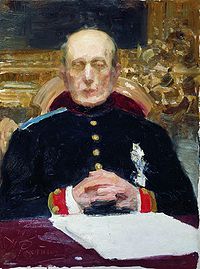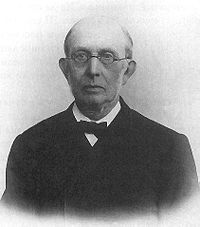- Konstantin Pobedonostsev
-
Konstantin Petrovich Pobyedonostsyev (Константин Петрович Победоносцев in Russian) (May 21, 1827 – March 23, 1907) was a Russian jurist, statesman, and adviser to three Tsars.[1] Usually regarded as a prime representative of reactionary [2] views and was the "éminence grise" of imperial politics during the reign of Alexander III of Russia, holding the position of the Ober-Procurator of the Holy Synod, the highest position of the supervision of the Russian Orthodox Church by the state.
Contents
Life
Pobedonostsev's father Pyotr Vasilyevich Pobedonostsev was a Professor of literature at Moscow State University. In 1841 he placed his son, then aged 14, in the St. Petersburg School of Jurisprudence, which had been established to prepare young men for civil service. After graduation Konstantin Pobedonostsev entered public service as an official in the eighth Moscow department of the Senate. The task of the department was to resolve civil cases from guberniyas surrounding Moscow. He was promoted rapidly within the eighth department.
At the same time in 1859 Moscow State University requested him, then aged 32, to hold lectures in civil law instead of V. N. Nikolski, who had moved abroad. For the next six years Pobedonostsev was lecturing eight hours every week while continuing to work in the eighth Moscow department. From 1860 to 1865 he was professor of civil law at Moscow State University. In 1861 Alexander II invited him to instruct his son and heir Nicholas in the theory of law and administration. As a result, Pobedonostsev had to resign from Moscow State University due to the lack of time.
In 1865 at the age of 38, he was elected Professor Emeritus at the university. But on April 12, 1865 his pupil Nicholas died, but Pobedonostsev was invited to teach Nicholas's brother Alexander (the future tsar Alexander III). In 1866 Pobedonostsev moved to a permanent residence in St. Petersburg. Pobedonostsev and Tsarevich Alexander remained very close for almost thirty years, from Alexander's ascension as a Tsar until his death in 1894.
In 1868, he became a senator, in 1874 – a member of the Council of the Empire, and in 1880 – chief procurator of the Holy Synod. In the latter office Pobedonostsev was de facto head of the Russian Orthodox Church, just the year before the Tsar was assassinated. During the reign of Alexander III he was one of the most influential men in the empire. He is considered the mastermind of Alexander's Manifesto of April 29, 1881, shortly after Alexander III ascended the throne after his father was assassinated.
The Manifesto proclaimed that the absolute power of the tsar in Russia was unshakable thus putting an end to Loris-Melikov's endeavours to establish a representative body in the empire.
Actually, Pobedonostsev's ascension in the first days after the assassination of Alexander II resulted in subsequent resignation of Loris-Melikov and other ministers eager for liberal reforms. He always was an uncompromising conservative and never shrank from boldly expressing his staunch opinions. Consequently, in the liberal circles he was always denounced as an obscurantist, pedant, and an enemy of progress.
After the death of Alexander III, he lost much of his influence over unfortunate Tsar Nicholas II, who was assassinated with his whole family in 1918. While Nicholas II clung to his father's Russification policy and even extending it to Finland, he generally disliked the idea of systematic religious persecution, and was not wholly averse to the partial emancipation of the Russian Church from civil control.
In 1901, Nikolai Lagovski, a supporter of socialist ideas, tried to kill Pobedonostsev. He shot in the window of Pobedonostsev's office but missed. Lagovski was sentenced to 6 years of katorga.
During the revolutionary tumult, which followed the disastrous war with Japan, Pobedonostsev, being nearly 80 years of age, retired from public affairs. He died on March 23, 1907.
He was fictionalized as old senator Ableukhov in the great novel of Andrey Bely called Petersburg (1912). Arguably he was also depicted in Leo Tolstoy's Anna Karenina as Alexei Alexandrovich Karenin.[3]
Perhaps in revenge, he ordered Tolstoy's excommunication in 1901. (Tolstoy had in fact left the Russian Orthodox Church voluntarily years earlier.)
Jurisprudence
Though Pobedonostsev is mostly known as statesman and thinker, his contribution to Russian civil law is significant. He is generally regarded as one of the most educated Russian jurists of the 19th century. His main work was three-volume "Course of Civil Law" (Курс гражданского права) published in 1868, 1871 and 1880 respectively.
Before the 1905 October Revolution the Course was reprinted several times with minor changes. The Course was regarded as outstanding guide for practising lawyers. Quotations from the Course are reported to have been used as a ground for decisions of the Civil Board of the Senate. The author's profound knowledge of Russian civil law resulted in description of many previously insufficiently explored institutions such as communal land law.
In addition, Pobedonostsev published in 1865 in Moskovskie Vedomosti several anonymous articles on the judicial reform of Alexander II.
He criticized the reform because, as he thought, Russia lacked highly qualified judges and in that situation the creation of an independent judicial branch was unreasonable.
Doctrine
 Pobedonostsev was known for his gaunt figure and pale, corpse-like countenance, as one may judge from this portrait by Ilya Repin.
Pobedonostsev was known for his gaunt figure and pale, corpse-like countenance, as one may judge from this portrait by Ilya Repin.
Pobedonostsev held the view that human nature is sinful, rejecting the Western ideals of freedom and independence as "dangerous delusions of nihilistic youth."
In his "Reflections of a Russian Statesman" (1896),[4] he promoted autocracy and condemned elections, representation and democracy, the jury system, the press, free education, charities, and social reforms. Of representative government, he wrote, "It is terrible to think of our condition if destiny had sent us the fatal gift—the all-Russian Parliament."[1] He also condemned Social Darwinism as erroneous generalisation of Darwin's Theory of Evolution.
In the early years of the reign of Alexander II, Pobedonostsev maintained, though keeping aloof from the Slavophiles, that Western institutions were radically bad in themselves and totally inapplicable to Russia since they had no roots in Russian history and culture and did not correspond to the spirit of Russian people. At that period, he contributed several papers to Alexander Herzen's radical periodical Voices from Russia.
He denounced democracy as "the insupportable dictatorship of vulgar crowd". Parliamentary methods of administration, trial by jury, freedom of the press, secular education – these were among the principal objects of his aversion. He subjected all of them to a severe analysis in his Reflections of a Russian Statesman. He once stated that Russia should be "frozen in time", showing his undivided commitment to autocracy.
To these dangerous products of Western rationalism he found a counterpoise in popular vis inertiae, and in the respect of the masses for institutions developed slowly and automatically during the past centuries of national life. In his view, human society evolves naturally, just like a tree grows. Human mind is not capable to perceive the logic of social development. Any attempt to reform society is a violence and a crime. Among the practical deductions drawn from these premises is the necessity of preserving the autocratic power, and of fostering among the people the traditional veneration for the ritual of the national Church.
Spanish journalist Enrique Gomez Carrillo compared Pobedonostsev with the Grand Inquisitors of Spain, and quoted him as saying to the later assassinated Tsar, "You have no right to relinquish your power. You are the arm of the (Orthodox) Church. If you become weaker, if you kneel down, then Our Lord Jesus will be asking you for your cowardy".
In the sphere of practical politics he exercised considerable influence by inspiring and encouraging the Russification policy of Alexander III, which found expression in an administrative nationalist propaganda and led to Tsarist Russia's most elaborately justified and most thoroughly carried-out programs of religious persecution, largely centered upon Russia's Jews. These policies were implemented by "May Laws" that banned Jews from rural areas and shtetls even within Pale of Settlement.
Pobedonostsev was influential in promulgation of all anti-Jewish measures taken during the Alexander III's administration, such as deportations of Jews from large cities, proscriptions of property ownership in rural as well as urban areas, enrollment quotas in public education, and the proscription to vote in local elections.
Saying, that "a third of Jews will be converted, a third will emigrate, and the rest will die of hunger," is often attributed to Pobedonostsev.[5][6][7][8] John Klier notes dubious provenance of this quote.[9]
According to British author Arnold White, interested in Jewish agricultural colonisation in Argentina, who visited Pobedonostsev with credentials from Baron de Hirsch, Pobedonostsev said to him: "The characteristics of the Jewish race are parasitic; for their sustenance they require the presence of another race as "host" although they remain aloof and self-contained. Take them from the living organism, put them on a rock, and they die. They cannot cultivate the soil."[10]
Although Pobedonostsev, especially during the later years of his life, was generally detested, there was at least one man who not only shared his views but also sympathized with him personally. It was the novelist Fyodor Mikhailovich Dostoyevsky[citation needed]. Their correspondence is still read with the utmost interest. "I believe that he is the only man who can save Russia from the revolution", wrote the Russian novelist[citation needed].
References and notes
- ^ a b Thompson, Ronald. The Government of the Soviet Union, 2nd edition. D. Van Nostrand, 1949
- ^ http://books.google.com/books?id=W8ETvpyQ26wC&pg=PA23&dq=pobedonostsev+reactionary#PPA23,M1
- ^ http://www.arsenalband.ru/now169.php
- ^ http://books.google.com/books?hl=en&id=EhQUAAAAIAAJ
- ^ http://www.eleven.co.il/article/13248
- ^ Leo Errera. The Ruissian Jews: Exterminiationt or Emancipation?, trans. Bella Loewy (London, 1894), p. 18:
- ^ Simon Dubnow, History of the Jews in Russia and Polanld, trans. I. Friedlaender, 3 vols. (Philadelplhia, 1916-20), Vol 3, p. 10
- ^ Virginia Cowles (1977) The Last Tsar and Tsarina: 25
- ^ John D. Klier. State Policies and the Conversion of Jews in Imperial Russia. In Robert P. Geraci, Michael Khodarkovsky. Of religion and empire: missions, conversion, and tolerance in Tsarist Russia. 2001. pp. 92, 106-107.
- ^ Arnold White. The Jewish Question: How to Solve It. The North American Review, Vol. 178, No. 566 (Jan., 1904), pp. 10-24.
Sources
 This article incorporates text from a publication now in the public domain: Chisholm, Hugh, ed (1911). Encyclopædia Britannica (11th ed.). Cambridge University Press.
This article incorporates text from a publication now in the public domain: Chisholm, Hugh, ed (1911). Encyclopædia Britannica (11th ed.). Cambridge University Press.- Byrnes, Robert (1969). Russian Conservative Though Before the Revolution, in:
- Stavrou, Theofanis (1969). Russia Under the Last Tsar. University of Minnesota Press. ISBN 0816605149, ISBBN 9780816605149. http://books.google.com/books?id=gjp_F0GMg74C.
See also
Works
- Reflections of a Russian Statesman by Konstantin Petrovich Pobedonostsev. Published by G. Richards, 1898.
- University of Michigan Press. 1964. ISBN 0472061046.
External links
- The Russian Empire, 1855 to 1900
- Review of Pobedonostsev's doctrines (in Russian)
- Encyclopedia article on Pobedonostsev (in Russian)
Categories:- Senators of the Russian Empire
- Russian philosophers
- Legal writers
- Imperial School of Jurisprudence alumni
- Members of the State Council of the Russian Empire
- 1827 births
- 1907 deaths
- Moscow State University faculty
- Russian monarchists
- Recipients of the Order of St. Andrew
Wikimedia Foundation. 2010.

